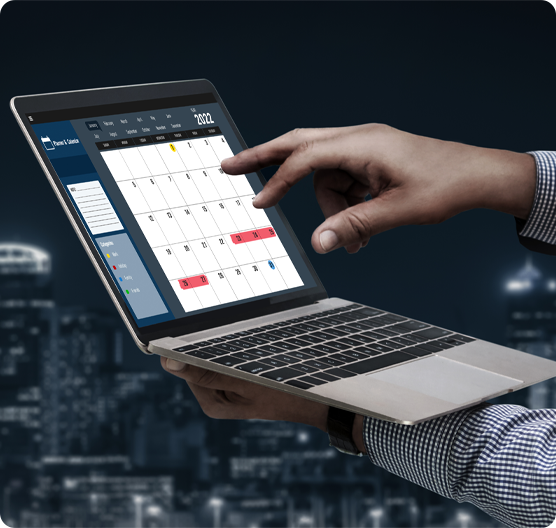Why Shift & Holiday Scheduling Tools Are Essential for Teams in 2025

Learn why shift scheduling software and holiday trackers are essential for modern teams. Discover how time-off management and HR calendar systems improve team productivity and workforce planning.
Introduction: The Complexity of Scheduling in Modern Teams
Gone are the days when a whiteboard or Excel sheet could manage team schedules. In 2025, with hybrid work, multi-location operations, and increased demand for flexibility, managing shifts and holidays has become a serious logistical challenge.
Enter modern shift scheduling software—smart tools that automate planning, track employee availability, and streamline communication. These systems, along with employee holiday trackers and HR calendar systems, help organizations maintain structure and avoid chaos in day-to-day operations.

What Is Shift Scheduling Software?
Shift scheduling software is a digital solution that allows managers to create, assign, and adjust work shifts for employees. These tools help forecast needs, prevent conflicts, and keep everyone on the same page—no matter how big or scattered the team may be.
Core Functions and Use Cases
- Create recurring and custom shift templates
- Assign employees based on availability and skills
- Notify employees instantly of schedule changes
- Track attendance and tardiness in real-time
- Integrate with payroll and HR modules
Why Every Team Needs an Employee Holiday Tracker
Avoid Overlaps and Ensure Fairness
When team members take time off without proper visibility, it can lead to understaffing and resentment. An employee holiday tracker allows managers to:
- View all upcoming leaves in a single dashboard
- Approve or decline based on team capacity
- Prevent multiple critical team members from being off at the same time
It’s essential for maintaining workflow balance and morale.

The Role of Time-Off Management in Team Efficiency
Time-off management systems help process vacation requests, sick leave, and personal days without the usual email chains and sticky notes.
Streamlining Requests and Approvals
With automation:
- Employees request leave via an app or portal
- Managers are notified and can approve instantly
- Systems auto-update team calendars and shift rosters
This eliminates miscommunication and boosts transparency.
How Shift Scheduling Tools Improve Productivity
Less Manual Work
Forget spreadsheets. Auto-assign features and drag-and-drop scheduling save hours every week.
Clear Communication
Instant notifications for shift assignments, changes, or coverage requests mean no one is left in the dark.
Challenges of Manual Scheduling and Excel Sheets
Using outdated scheduling methods leads to:
- Human error in data entry
- Miscommunication of schedules
- Missed shifts or double bookings
- Poor recordkeeping for HR and payroll
Manual processes simply can’t keep up with modern business needs.
Workforce Planning Tools for HR and Operations Teams
Workforce planning tools use past data and future forecasts to help managers:
- Anticipate staffing needs
- Adjust shift coverage dynamically
- Optimize labor costs
- Prevent both overstaffing and understaffing
This data-driven approach supports better decision-making and smoother operations.
Benefits of a Centralized HR Calendar System
Company-Wide Visibility
With an integrated HR calendar system, everyone—HR, team leads, and employees—can see:
- Who’s on leave
- Team events
- Payroll cut-off dates
This reduces confusion and improves coordination.
Easy Reference
Access anytime, anywhere—great for remote and hybrid teams.

Real-Time Syncing with Mobile Apps and Calendars
Today’s scheduling tools are built for mobility. Features include:
- Mobile access for checking shifts or making changes
- Push notifications for new schedules or updates
- Calendar sync with Outlook, Google, or Apple
- Self-service portals for employees
These tools make it easy to stay updated without relying on management follow-ups.
How to Automate Shift Rotations and Coverage
Smart software allows users to set recurring shift templates, rotating schedules, or auto-fill rules based on:
- Employee availability
- Skillset
- Labor law compliance
This minimizes last-minute panic and ensures coverage is always balanced.
Managing Peak Seasons and Holiday Staffing
Whether it’s Christmas, tax season, or launch month—peak periods require meticulous planning.
Forecasting Tools
Shift scheduling software uses historical data to predict busy times, helping you allocate resources well in advance.
Capacity Planning
Prevent burnout by ensuring fair shift distribution and monitoring employee workload.
Integration with Payroll and Attendance Systems
Time-off and shift data can automatically feed into:
- Payroll systems for accurate compensation
- Attendance logs for legal compliance
- Overtime calculations
No manual entry means fewer errors and faster processing.

AltTask’s Shift & Leave Management System
AltTask provides an all-in-one solution for workforce scheduling and leave tracking:
- Drag-and-drop shift planner
- Mobile-friendly holiday request system
- Integrated calendar view for team visibility
- Compliance tools to track hours and rest periods
Internal Link: See how AltTask’s HR tools simplify time-off and shift management.
Case Studies: How Teams Benefit from Scheduling Tools
Healthcare Facility in Toronto
Reduced missed shifts by 35% after switching to AltTask for nurse and staff scheduling.
Retail Chain in Melbourne
Increased employee satisfaction scores by 25% thanks to fair holiday planning and time-off transparency.
IT Support Firm in Dubai
Slashed shift planning time by 60% with AltTask’s automated templates and mobile alerts.
Choosing the Right Scheduling Software for Your Team
Must-Have Features
- Mobile access
- Integration with payroll
- Shift templates
- Real-time alerts
- Leave management
Internal Link: See how AltTask’s HR tools simplify time-off and shift management.
Clear Communication
Instant notifications for shift assignments, changes, or coverage requests mean no one is left in the dark.
FAQs About Shift Scheduling and Holiday Tracking
It’s used to assign, adjust, and monitor work shifts efficiently, reducing conflict and ensuring coverage.
Yes. Most platforms, including AltTask, allow employees to request leave via mobile or desktop apps.
Absolutely. Even in small teams, tracking holidays ensures fairness and avoids disruptions.
Yes. AltTask and similar platforms support auto-rotation based on pre-set rules.
They track hours worked, absences, and overtime—feeding data directly into payroll systems.
Yes. In 2025, mobile access is essential for real-time communication and flexibility, especially for remote or field teams.
Conclusion: Smart Scheduling Builds Happier, Productive Teams
In 2025, efficient workforce planning goes far beyond assigning shifts—it’s about empowering teams, ensuring fairness, and optimizing operations. From shift scheduling software to employee holiday trackers and full HR calendar systems, smart scheduling tools reduce stress and increase productivity across the board.
With a powerful solution like AltTask, your team can spend less time coordinating schedules and more time doing meaningful work.



